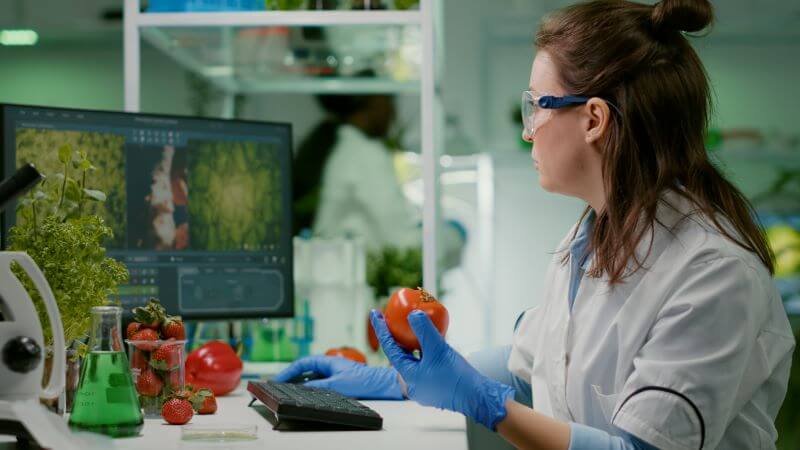Colorectal cancer, which includes cancers of the colon and rectum, is one of the most prevalent types of cancer in many Western countries. However, it is also one of the most preventable cancers, largely achievable through a healthy lifestyle and balanced diet. Each year, March is designated for raising awareness and prevention of colorectal cancer during the national initiative known as Blue March.
Colorectal cancer continues to be one of the most widespread and fatal cancers in various parts of the world. Early detection significantly increases the chances of recovery, underscoring the importance of routine screenings. Among the various genetic and environmental factors at play, diet holds a critical role. Certain dietary habits can elevate the risk of developing this type of cancer, while others may provide protective benefits.
What Are The Risk Factors For Colorectal Cancer?
Can Your Diet Contribute To Colon Cancer?
A high intake of saturated fats and red meat increases the risk of colorectal cancer. Excessive alcohol consumption and sugary drinks are also well-established risk factors. These dietary patterns can result in chronic inflammation and disrupt the gut microbiome, thus heightening cancer risk.
Similarly, a diet low in fiber and essential nutrients can impair the digestive system’s functionality and promote the growth of cancerous cells.
The Impact Of Gut Microbiome
The gut microbiome plays a vital role in preventing colorectal cancer. However, an imbalance within this microbiome is often associated with a diet heavy in processed foods and lacking in fiber. This imbalance can create an environment conducive to tumor development.
Conversely, dietary practices that promote a healthy microbiome, like consuming probiotic-rich foods, can help maintain intestinal health and prevent colorectal cancer. Incorporate fermented foods like yogurt, kefir, or sauerkraut, which are abundant in probiotics, into your diet regularly.
Silent Enemies
Aside from diet, other risk factors include physical inactivity, alcohol use, smoking, and obesity. All these behaviors contribute to systemic inflammation and cellular dysfunction, thus increasing the likelihood of developing various cancers, including those of the colon and rectum.
Eating Better To Protect Yourself
Protective Foods
Certain dietary habits can provide a protective effect against colorectal cancer. A diet rich in fiber, antioxidants, omega-3 fatty acids, and polyphenols reduces the risk. Here are some food allies for your protection!
- Fiber is abundant in fruits, vegetables, legumes, and whole grains. It supports regular bowel movements and minimizes contact with carcinogenic substances.
- Berries, such as strawberries and raspberries, are loaded with antioxidants, which help combat inflammation.
- Leafy green vegetables, such as spinach and kale, also possess anti-inflammatory properties and can help in preventing colorectal cancer.
- Turmeric is a spice known for its anti-inflammatory and antioxidant effects and may play a protective role against this cancer.
Reducing Your Intake Of Red Meat And Processed Products
It’s advisable to limit red and processed meat consumption, as these are linked to an increased risk of colorectal cancer. Enjoy these foods in moderation to keep them as a treat.
- Opt for gentler cooking methods, like steaming or baking. These techniques reduce the formation of carcinogenic substances that can occur when cooking at high temperatures, such as grilling or frying.
- Replace them with healthier protein sources, such as fish, legumes, or plant-based proteins (tofu, tempeh).
Omega-3: Fats That Benefit Your Colon
Omega-3 fatty acids, found in fatty fish, flaxseeds, and walnuts, are anti-inflammatory and help protect against colorectal cancer. Including foods high in omega-3, like salmon or chia seeds, in your meals can play a key role in cancer prevention.
Colorectal Cancer Prevention: Simple Daily Actions
How To Eat Healthy Every Day
Preventing colorectal cancer involves incorporating healthy dietary habits into your daily routine. Start by increasing your intake of fruits, vegetables, legumes, and whole grains.
Vary your meals by including a wide range of seasonal fruits and vegetables and choosing whole grains. Prioritize plant-based protein sources and oily fish while limiting red meat and processed products.
Just 30 Minutes A Day To Lower Cancer Risks
Regular physical activity plays a major role in colorectal cancer prevention. Moderate exercise for 30 minutes each day can improve gut health, decrease inflammation, and help maintain a healthy weight.
Activities such as brisk walking, swimming, or cycling are excellent choices. Ultimately, the important thing is to stay active every day. Incorporating simple physical activities, such as taking the stairs or going for a walk after meals, can yield long-term benefits.
The Importance Of Hydration For Gut Health
Staying adequately hydrated each day is essential for proper digestive system functioning. Sufficient water intake promotes regular bowel movement and prevents constipation, a factor that may elevate colorectal cancer risk.
Additionally, herbal teas, broths, and high-water fruits, such as cucumbers and watermelons, contribute to maintaining good hydration balance in the body.
Preventing colorectal cancer hinges on balanced dietary choices, regular physical activity, and a healthy lifestyle. By incorporating these simple habits into your everyday routine, you can significantly reduce your risk of developing this type of cancer.
Moreover, adopting a healthy diet is truly an investment in your future. The benefits of good nutrition extend beyond cancer prevention, also improving overall well-being and helping to prevent other chronic diseases.
Don’t forget the importance of early screenings and regular consultations with your doctor to take care of your intestinal health.
IMPORTANT TO NOTE
In France, regular screenings for colorectal cancer are one of the most effective means of preventing this disease. Starting at age 50, it is recommended to undergo a screening test every two years, allowing for the detection of any abnormalities before they develop into tumors. This screening is completely free and covered by health insurance, and it can be easily done at home.







